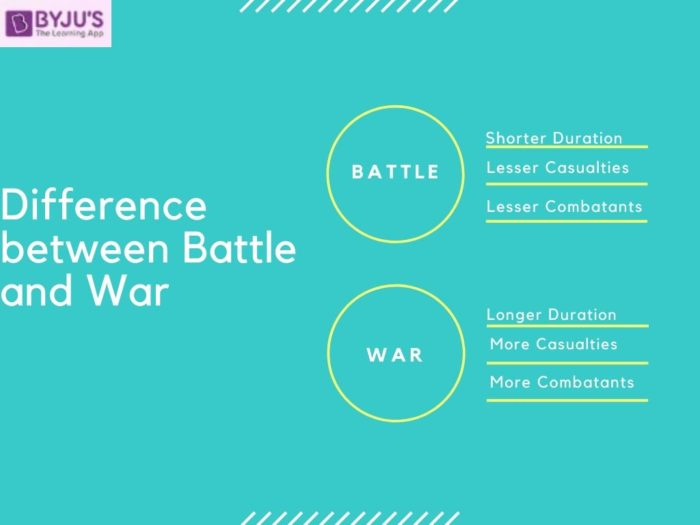Difference between Battle and War is explained here in detail.
A battle is a military conflict between two or more armed forces that are well defined in duration, area, and force commitment.
War is an intense armed conflict between Militaries, Governments characterized by extreme violence, aggression, destruction, and mortality that stretches for many months or years.
Candidates appearing for the Civil Service Examination conducted by UPSC can visit the given link for information on dates, structure and other details related to the IAS Exam.
Difference between Battle and War – UPSC Notes:- Download PDF Here
This article will give relevant information on the difference between battle and war which will be of immense use for candidates appearing for UPSC prelims.
Aspirants can check the following links to align their preparation for UPSC 2022 examination:
|

The major differences between Battle and War are:
| Battle | War |
| Usually, battles are fought with fewer resources on both the sides and takes place for a shorter duration in a particular location | Wars are a combination of many battles fought over many days with huge resources deployed by both sides in many locations. |
| Battles are usually of shorter duration. | Wars could last for months or even many years. World Wars are a good example of Wars getting stretched for many years. |
| In battles the army may choose to deploy strategies that will help them capture vantage points in the battlefield, strategies are made keeping in mind the number of equipment, soldiers available with each side and also strategies are made based on terrain. | The strategies implemented are different since the objectives to be achieved are different during the Wars. To bring about complacency in the enemy, an army may choose to lose a battle in order to win the war. During Wars, armies employ a strategy named as Decapitation strategy, it involves eliminating the strategic assets of the enemy and eliminating their main leaders. |
| The Impact of losing a battle is different from that of a war. Losing a battle need not necessarily mean the entire war is lost, armed forces can recuperate from a loss in Battle. | The Impact of losing a War is that the nation would have lost its territory to the enemy nation. |
| Battles have fewer combatants and equipment used compared to war. | Wars have a huge number of combatants and equipment used by all sides. |
| A battle is usually fought in one location | War is a combination of many battles taking place in many locations. World War witnessed simultaneous battles taking place in different countries |
| The death of the number of civilians in a battle is less compared to a war | The deaths of civilians and loss of property are massive during wars. |
After understanding the differences between Battle and War, visit the below-given links to understand more about the various battles and wars that took place in the past.
- 1965 Indo-China War
- Cold War – World History
- Gulf War – Causes, Results
- NCERT Notes: First and Second Anglo-Mysore War
- NCERT Notes: First Anglo-Maratha War
- NCERT Notes: Battle of Plassey
- Battle of Buxar – Causes and Treaty of Allahabad
- First Battle of Panipat
- Difference between Allied and Axis Powers
- Difference between Articles – Complete List (History, Geography, Polity and More)
Frequently Asked Questions about Battle and War
In what context is the word ‘battle’ used?
What is the reason for outbreak of Wars?
Before making concrete plans for the Civil Services exam, candidates should have a thorough knowledge pertaining to the Syllabus of UPSC.
Related Links
| IAS Salary | Static GK |
| Gupta Empire | Present CAG |
| GI Tag Full Form | National Skill Development |
| Battle of Kohima | Who Appoints the Chief Election Commissioner of India |
Comments